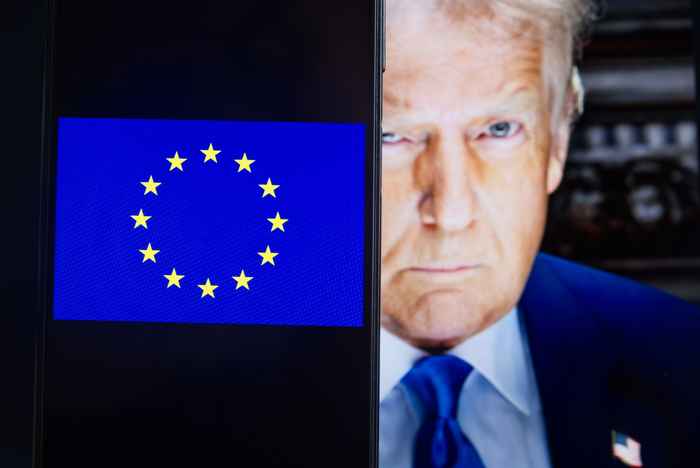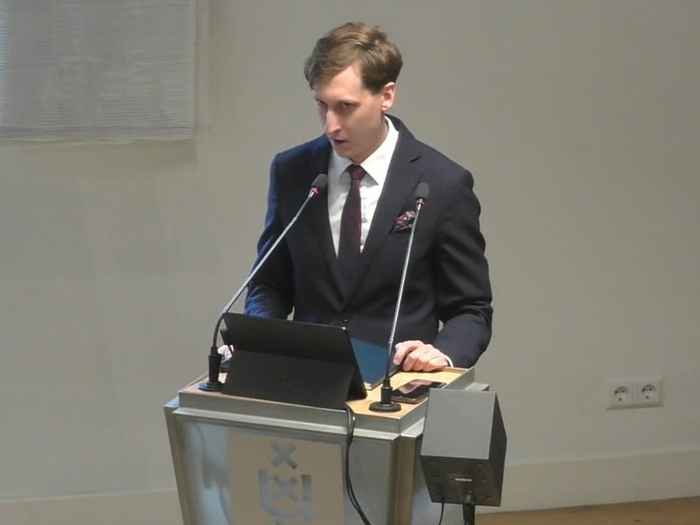‘Trump’s tariffs will steer the EU to more pragmatic deals’
Amsterdam Law School
20 June 2025

What effect do EU trade policies have?
‘If the EU adjusts its existing trade policies, we'll notice this in the availability and pricing of everyday products. Currently, the EU has a trade agreement with Japan that makes it cheaper to buy Japanese cars and food in supermarkets. But those prices could rise if the policy is amended. We tend to only appreciate what we have when things go wrong. Now that Trump wants to increase tariffs, it’s suddenly quite likely that prices of consumer goods, electronics for example, will rise.’
How do you get the best trade deal?
‘A common misconception people may have about trade is that we need to have close relationships with a partner to trade with them. Ultimately, the negotiating power of a state depends on its economic power. The EU has been very successful in making trade deals. Size and economic power matter. In trade policy, the EU is effectively acting like a federal state, which translates to negotiation leverage. It's a huge advantage that the EU has gathered forces. But in my research, I wanted to see how democratic this trade policy still is. In EU law we don’t have a good clear benchmark or control on how democratic the policy is or how effective it is in preventing abuse of power.’

EU politicians tend to speak from a position of moral superiority
Could there be abuse of power?
‘In any political body, power tends to corrupt people. In general, to abuse power in the EU, you need a lot of coordination to accomplish something dramatic. This is because there are so many actors involved: NGOs, member states, consultants. At the same time, because there are so many actors involved, it is hard to say who is politically responsible.’
In what way could the EU trade policy not be democratic?
‘Lobbying is an essential part of the lawmaking process. Because the EU lawmaking process is somewhat complicated, people are not that interested in all the details. The public just wants to know how much they’ll end up paying at the supermarket. This makes it easier for someone powerful to push their own personal agenda. They might have access to parliament members, but it will be hard for the public to find out that a specific legal provision is the result of a pharma director using their political connections in the European Parliament.’
Isn’t this kind of lobbying regulated?
‘There is some control in place. If you’re lobbying in the EU, you need to register all of your meetings. But a powerful actor will always find a way. If you have informal connections to politicians, it gets easier. It’s about whose voices are being heard. I interviewed people working at NGOs and they told me that yes, they have the opportunity to express their opinions, but they don’t feel like they are being listened to. EU officials sometimes listen just for the sake of listening. NGOs believe that businesses are more convincing when they go to similar consultations with EU officials.’

Piotr Krajewski defended his dissertation “Democracy, Control, Legitimacy: Separation of Powers and EU Trade and Investment Policy’ on 2 June. He is affiliated with the Amsterdam Centre for European Law and Governance (ACELG). Krajewski completed a master’s in European law at the College of Europe and obtained his law degree from the University of Warsaw.
Why is that?
‘Politicians tend to be more receptive to business because that is what EU Member States, and its governments are most interested in. We want our business to have good deals. For instance, we want companies like Phillips to be competitive, generate profit and offer well-paying jobs. National politicians on whom EU officials depend, tend to prioritize economic interests. But we also need firm NGOs. They can make sure that trade doesn’t harm our diversity policy or climate goals.’
How does that work on a global scale?
‘Well, it doesn’t help you to make a lot of friends globally. In the World Trade Organization, the EU, along with the US and Japan, was most often the object of litigation. Which means that other states were unhappy with something that the EU was doing. We are very good at protecting our own interests in some policy areas. We heavily subsidize our agricultural sector and have very stringent food quality standards. We have ruthlessly defended these at the World Trade Organization. That doesn’t sit well with our trade partners. EU politicians also tend to speak from a position of moral superiority: “We are global leaders on climate policy and fundamental rights protection, so you should listen to us.”. Other partners see that as patronizing. If you compare that with our declining economy and demographic power, it sure doesn’t make us many friends.’
How do you see the future of EU trade with Trump’s tariffs?
‘We will see more pragmatic trade policies: smaller deals targeted at raw materials. If you are pragmatic enough, you are more likely to strike a deal with anybody. We don’t have many raw materials, so our prosperity and welfare depend on trade. Trump’s tariffs are a disruptive factor and create an incentive to find other partners. The new Canadian prime minister said that they are the most European non-European country. You have to be flexible. The tariffs aren’t helping us, but it’s far from the end of the world.’